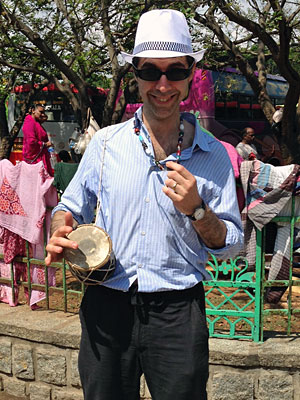Chess Tourists – a pictorial report from Chennai
By Michael Davey and David Goldstone
Kasparov coined the phrase “chess tourist” in 1999, to much consternation. He then adopted the epithet to describe his own role during his brief visit to the World Championship in Chennai in 2013. Kasparov is of course anything but a chess tourist, and was relegated to a modest row of seats in the middle of the auditorium during the game. By contrast, as genuine chess tourists, having achieved not even club player status, but fired up with admiration and enthusiasm for chess played by the world's greatest, my companion and I were allocated seats towards the front.
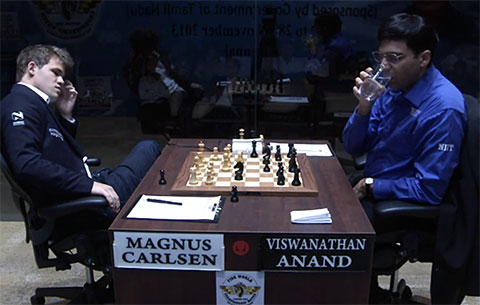
Our initial impressions as mere tourists were of disappointment. There was no commentary available to those who had paid to watch the match, and all mobile devices were bizarrely banned from the auditorium – was there a concern that someone would physically signal to a player through the plate glass separating the audience from the players? Unless semaphore flags were used, we were unable to conceive how this could be done.
But as we watched our first game (we arrived for game six) the lack of commentary became a bonus. Though the GM analysis was excellent, and we had enjoyed it before travelling out to India, being cut off from all guidance other than our own thoughts was in fact a liberating experience. With the glass partition in place to shield the players from noise, we were able to discuss the game between ourselves, to appreciate for ourselves the mental exertion required, and to learn from the game.
It was encouraging to see the auditorium full of other chess enthusiasts; there were many local children, accompanied by their parents, and excited to watch the action. We suspected they were far more advanced in chess than we were. Fortunately, we met up with a chess player of some talent (thank you Tarek), who gave us invaluable insights into the games as they progressed. Not all spectators were so well informed. At the end of game six my companion confidently announced to the watching audience that the players had agreed a draw (Anand had in fact resigned). It is a rare sport indeed where the spectators need some ability in order to work out the result at the end of the game!
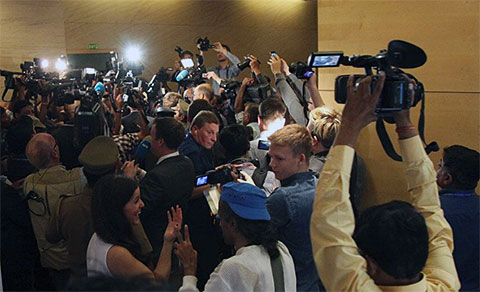
As true chess tourists, of course we had plenty of opportunity to explore the city of Chennai and the beaches to the south. Chennai is a sprawling and chaotic city, like many in Asia, but also has hidden and surprising charms, such as a remarkably well-preserved street of gorgeously coloured Art Deco houses, presumably built for colonial civil servants in the 1930s.

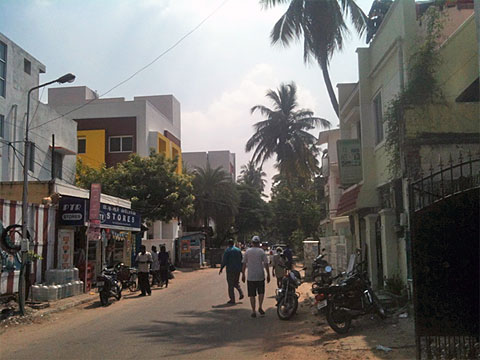
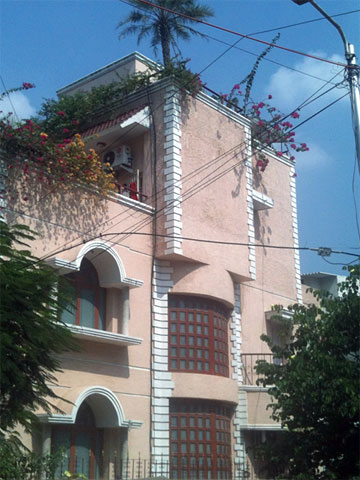
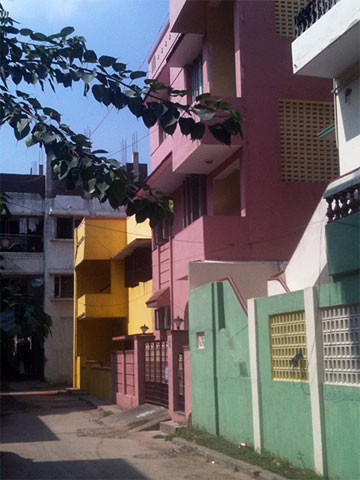
One striking feature of the city was the abundance of posters displaying the countenance of the Chief Minister of Tamil Nadu, a former actress who had apparently played a role in bringing the match to Chennai. Her cult of personality would have made many great leaders envious.

On a rest day, we took a trip to the south of Chennai, to Fisherman's Cove. Certainly there were some fishermen, but the greatest surprise was to discover, before breakfast on a Monday morning, that most of the village were down at the beach to take a dip in the Bay of Bengal. Though our flabby and pallid torsos must have been a sorry sight to the locals, Indians are far too kind to stare, still less to treat us as outsiders, and we entered the water as if we had lived there all our lives.
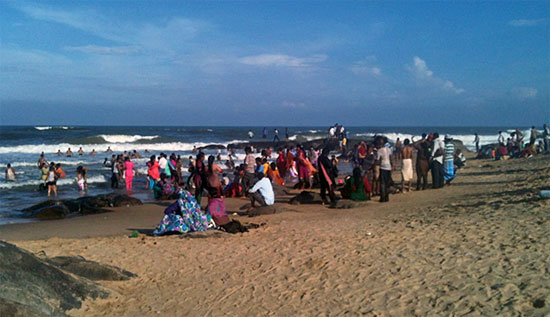
After the usual sumptuous Indian breakfast, we took a tour of the wonderful Mahabalipuram temples...
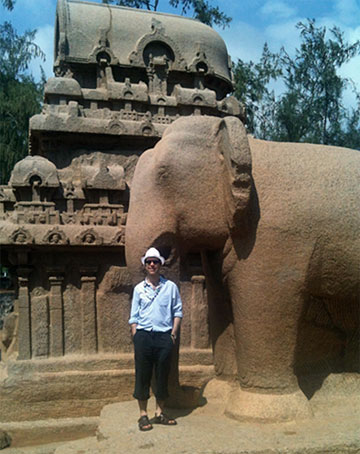
... before returning to Chennai for the next chess instalment.
Between games, we visited a “happening” Chennai night club and watched the youngsters party while we played chess on an iphone; we explored the historic sites in the city, including the charming but now sadlly decaying original English fort settlement.
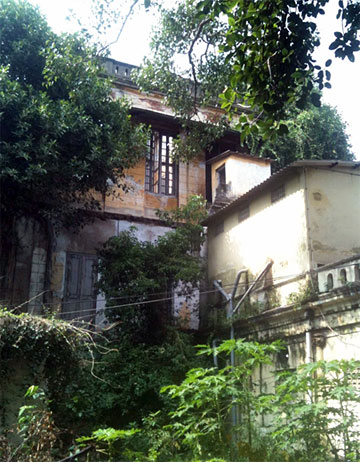
We browsed the library in the Connemara complex (a sort of Indian version of the museum at South Kensington) which has a fabulous collection of 19th and early 20th century books laid out on old Victorian mahogany tables, including collections of exam papers for the Indian Civil Service, showing a humbling level of assumed knowledge …
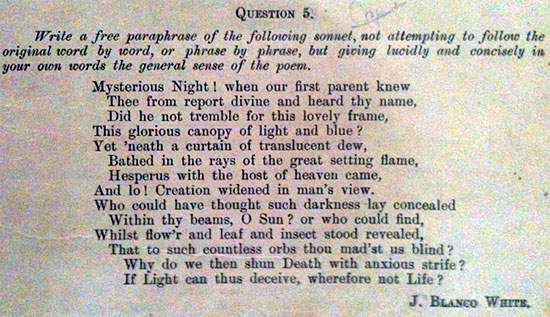
... and the sort of illustrated hand coloured ornithological and botanical works which in England would be locked away and handled only with cotton gloves.
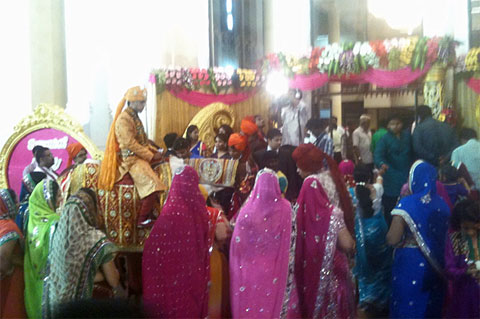
We also attended a wedding uninvited (but unobtrusively) ...

... explored night markets selling everything from flowers,
fruit and vegetables to Christmas decorations from London, ...

and admired the local wildlife….
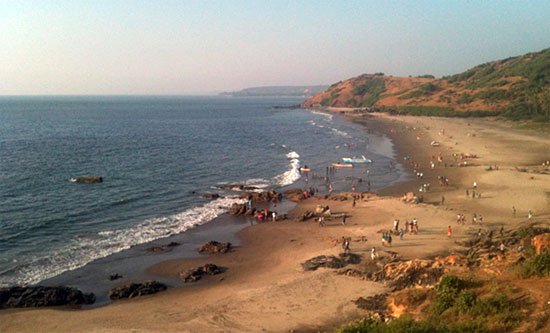
We left Chennai for the beaches of Goa before the end of the match
The result was clear, and it was painful to watch. Carlsen was clearly dominant, and Anand was not at his best. Still, we doubt whether any future championship will be able to provide so much for the chess tourist: two truly wonderful chess players; one of the world's great cuisines; a surprising city; tropical beaches; and friendly locals. This combination will be hard to beat.
The authors
Michael Davey, left, in a restaurant in Goa, waiting for a fish curry to arrive, and David Goldstone, sporting trophies from a local market, are both barristers practicing shipping law in London. Neither has ever played chess competitively, but, as Michael says, "we have plenty of enthusiasm to make up for a lack of talent."
See also
-
11/18/2013 – Chennai: Impressions from the World Championship
Senior ChessBase editor Frederic Friedel, who is a personal friend of both the World Champion and the Challenger, has undertaken a trip to South India to attend at least part of the World Championship. In a series of special reports he will provide us with his impressions of Chennai and the venue of this spectacular event. Part one is about getting there and settling in.
-
11/20/2013 – WCh Chennai: Languages of India, and of chess
The World Championship press room is filled with journalists from all parts of India, and they are filing reports in a dozen different languages. The main Indian language is Hindi, spoken by over four hundred million people. But Chennai is in the middle of the Dravidian language family that is less closely related to Hindi than, let us say, Norwegian (both Indo-Aryan languages). We thought we would give you an impression of the local dialects.
-
11/22/2013 – More impressions from Chennai
The chess match is nearing its end and we are set to leave the south Indian city that is hosting it. The stay was very interesting and as promised we will be providing you with impressions around and outside the event. On one of the free days ChessBase editor Frederic Friedel accompanied two young chess ladies on a shopping tour and visited a famous temple in the city. Big pictorial report.
-
12/15/2013 – Looking back at Chennai: WCh solving contest
One of the daily attractions of the World Championship in Chennai last November was the problem and study contests that were held in the hotel lobby during every round. Scores of competent, enthusiastic and highly motivated solvers participated. The organiser of the solving contest, C.G.S. Narayanan, kindly sent us a set for our readers to solve. You have 90 minutes to do so.
-
Official tournament site + All ChessBase reports


































